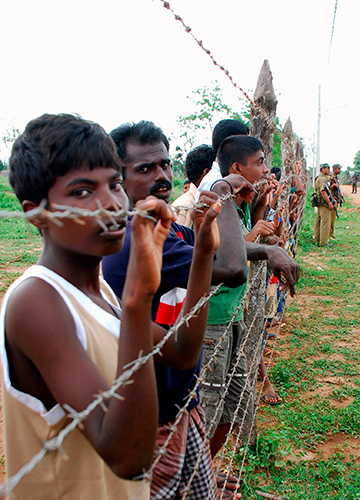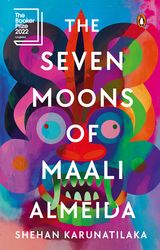The 26-year-long civil war between the Sri Lankan army and the Liberation Tigers of Tamil Eelam (LTTE), which ended in 2009, was perhaps one of the longest and bloodiest wars in recent times. The Eelam war, as the Tamils called it, was a cesspool of horror stories that left a deep scar in the minds of Sri Lankan citizens. The turmoil in the country today harks back to that violent past of political murders, exodus of refugees and storming of government establishments.
When life turns into such a purgatory, looking at it through the lens of tragedy would be somehow inadequate. That is why Sri Lankan writer Shehan Karunatilaka, 47, chose a different weapon—dark comedy. He first wielded it in his first novel, Chinaman: The Legend of Pradeep Mathew (2010), which won him the Commonwealth Prize and the DSC Prize for South Asian Literature.
In the book, he uses cricket as a device to frame the pain and agony of civil war victims through the story of a drunken cricket journalist who decides to track down the greatest left-arm Sri Lankan spinner of the 1980s, Pradeep Mathew. If death was the predominant motif of the civil war, then Karunatilaka cockily acknowledges it by setting his second and third novels, Chats With The Dead (2010) and The Seven Moons of Maali Almeida (2022), in the afterlife—through the story of Maali Almeida, the war photographer who wakes up one morning to find himself dead. As he navigates the afterlife, jostled by a group of chatty ghosts, he is tasked with solving his own murder, a difficult task in a war-ravaged country where there is no dearth of land-mines, suicide bombings and death squads. He has seven moons to get a box of war photographs, which he has hidden in his room, to the outside world. The photographs, he knows, will shock the country and maybe even topple the government.
The Seven Moons of Maali Almeida, which won the Booker Prize this year, was nominated along with Glory by NoViolet Bulawayo, Small Things Like These by Claire Keegan, Treacle Walker by Alan Garner, The Trees by Percival Everett and Oh William! by Elizabeth Strout.
Karunatilaka feels that unlike the Holocaust, about which much has been written, there is a black hole in public memory when it comes to the Sri Lankan conflict. Once, at a writers’ workshop, he was surprised that not even the literary circles knew much about it. One of the reasons, he feels, is because not many images of the war have survived. “Maybe there are a few photographs that are being used, but they do not capture the scale of the atrocities,” he tells me from his home in Kurunegala in the central-western province of Sri Lanka. “And there are a couple of questions in my mind. For example, where are these photographers? Why are they just here in these stories? I started imagining how these photographers had their cameras confiscated in the conflict, and how they were all exiled. Somewhere, they are living in hiding, waiting to exhibit these photographs. This was a great literary area for me to explore. I found the device of framing the story as a supernatural murder mystery to be useful.” He took almost a decade to visit war-ravaged places, speak to families of victims, experience their pain and then bring it out through Maali’s Nikon lens.
Karunatilaka’s tryst with literature began in college. His father wanted him to pursue accountancy, but he joined the literature course without telling his father. It was only in his third year that Karunatilaka enlightened him. After college, wanting a creative outlet, he drifted into advertising. Simultaneously, he was playing bass for a rock band. It was while writing lyrics for a song that he fully realised his flair for writing. The lyrics, he found, came very easy for him. So he decided to go full-throttle and give his all to writing his first book, Chinaman. “Since then, my life has been action-packed with lots of reading and writing,” he says. “While Chinaman travelled the world, I got married, had children, moved to Singapore and wrote my second novel.”
Like his ghosts, his literary heroes—Kurt Vonnegut, George Saunders, Margaret Atwood, Cormac McCarthy, David Mitchell and William Goldman—wade in and out of his books, in the form of the writing style that he has adopted. If these honed his sense of satire, his early influences—Agatha Christie, Stephen King, Neil Gaiman and Ira Levine—created in him a love for the dramatic, out of which were born his drunken sports journalists and lavish ghosts. They don’t just people his novels, they also haunt your imagination, much after you turn the last page.
The Seven Moons of Maali Almeida
By Shehan Karunatilaka
Published by Penguin
Pages 400 Price Rs399




